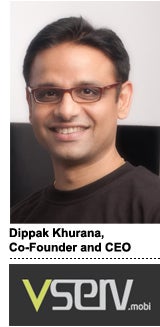 In emerging markets worldwide, where mobile-first internet users are more common, mobile programmatic has become an interesting space for ad tech companies and advertisers alike. Vserv, a mobile ad exchange working exclusively in emerging markets, launched its mobile RTB platform in December 2013.
In emerging markets worldwide, where mobile-first internet users are more common, mobile programmatic has become an interesting space for ad tech companies and advertisers alike. Vserv, a mobile ad exchange working exclusively in emerging markets, launched its mobile RTB platform in December 2013.
Dippak Khurana, the co-founder and CEO of Vserv, has been working in online advertising in India since 1996 and the mobile space since 2000, having worked at Yahoo India prior to starting Vserv in 2010.
“In 2010 the mobile internet adoption in these markets was still very low, but the app economy and app ecosystem had just about started to kick in,” he told AdExchanger. “We rolled out our [app monetization platform] AppWrapper product, which resonated well with global app developers. And that allowed us to lay a very strong foundation across these markets.”
Khurana spoke to AdExchanger about why Vserv decided to focus on emerging markets, the challenges it faces as a mobile ad exchange and the future he sees in mobile programmatic in these markets.
AdExchanger: You launched in 2010. What is your headcount now and what plans do you have for growth?
DIPPAK KHURANA: Yes, we launched in 2010 and the company has grown from a 10-member team to about 180 people globally today. Last year, we were at about 75 to 80 people, so we’ve added roughly 100 people in the last 12 months.
In terms of growth for us, in the next 12 months we will be closer to 300 people and our focus remains on these emerging markets. Given the strong advantage we have, we have a head start across these markets. We are the only player that is focusing across these four regions: Southeast Asia, India, Latin America, and the Middle East and Africa.
Why did you decide to focus on these emerging markets and this strategy for the company?
For us, we looked at mobile-first users. As the world becomes more and more connected, roughly 45% of the global internet users will come from these geographies. That was a large problem to be solved. We started out of India and we also realized that strategically for us, a company coming out of India trying to expand into these markets would be playing to its own strengths.
Another reason is just the market opportunity across these countries. They are often in similar stages of market development in terms of smartphone penetration and dealing with similar problems. That’s really why we focused on these geographies.
And can you tell me a little bit about the funding of the company and who are your investors?
Our investor is IDG Ventures. Overall, we have raised about $7 million. And the company has been growing quite quickly. As a company in the next three years, we would like to see our revenues surpass $100 million.
And what regions are exciting right now when it comes to mobile programmatic? Where do you see the next burst of growth happening?
Within APAC, China is definitely an interesting place for programmatic buying. And Japan is also at an interesting stage of programmatic buying. In 2013, we started to see meaningful experiments in those regions.
And having said that, when you look at Southeast Asia and India, they’re really behind when it comes to programmatic buying. But we see 2014 as the beginning. In December 2013, we rolled out our own RTB platform. We have gotten early adoption on that and we do see 2014 as the beginning of mobile programmatic buying in many of these markets.
What are the main challenges you face as a mobile ad exchange in these emerging markets?
First, as a mobile ad exchange especially in context to these emerging markets, newer technologies like RTB or programmatic buying are still at a very low adoption in these markets. The second piece is that lack of organized data is a challenge. These are not necessarily challenges for mobile advertising, but more emerging market challenges. And we are finding out innovative ways to solve these problems.
The interesting part has been that, given the fast adoption of mobile internet users, there aren’t as many challenges in terms of advertisers or developers. When people are creating apps, they get great amount of downloads. Advertisers are highly interested because of the fast growth of users.
What do you see as the future of programmatic for the markets where you’re working?
We see a very bright future for programmatic because for most of these markets, they are large e-commerce markets as well. Many countries are already starting to see mobile transactions and I would say 5% to 6% of their users have started transacting on mobile. That’s going to increase significantly just because of the scale of users out there.
And programmatic will play a key role in mobile because in these markets, there is scale. Look at India. At this point, India is 115 million mobile users as opposed to 100 million PC internet users. In the next two years, that will double from 115 million mobile internet users to 300 million mobile users. So that’s attractive to advertisers because when they are buying, they can buy at scale.
Also, when advertisers are looking at segmenting audiences and improving the data that is available, this will facilitate programmatic buying in these markets significantly. These are all good drivers. There’s scale; you’re able to play with data for better audience targeting; and there are better data tracking tools, which makes it easier for programmatic buying.












